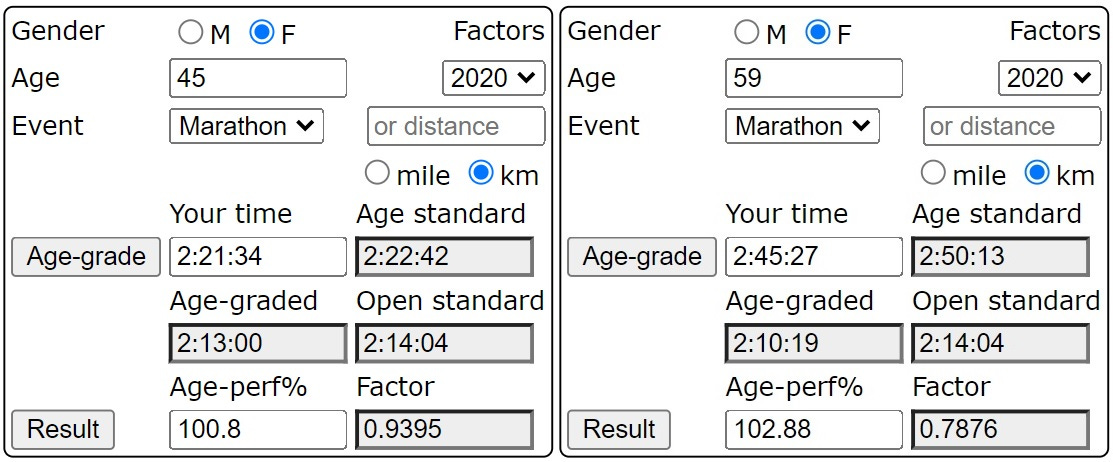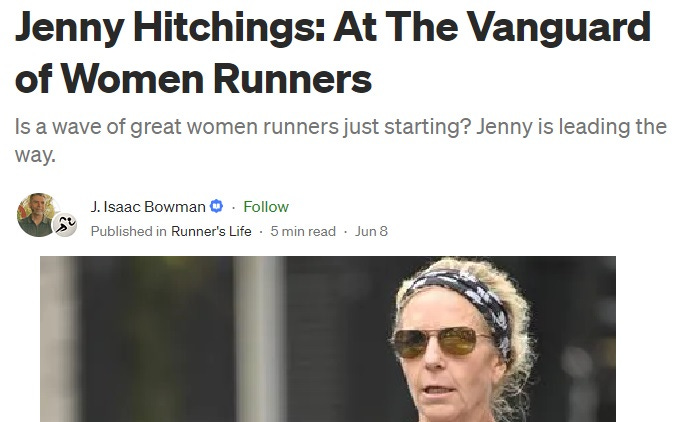"We need more scientific research on women runners" is an inane refrain for at least three reasons
Not including the lack of curiosity about age-group superheroines
“Women are vastly underrepresented in scientific research” has become a buzz-phrase among the pseudo-feminists who read or write for squawkhole sites such as Women’s Running and Fast Women. Just like “People of color are vastly underrepresented in the industry” and its various relatives, it’s a claim that relies on a surface-level “analysis” of statistics that don’t mean much at deeper levels anyway.
Earlier this month, Women’s Running published a story, “How Whoop Is Pushing Forward Women’s Health Research,” revisiting this theme. Here are the five words in the piece that stood out most to me even though I doubt the story’s author, Ashley Mateo, even blinked as she typed them:
Whoop … has quietly been compiling massive data sets
Yeah, and selling them to the government. It’s another problem we’re* learning more about if we track reliable sources of information. But sticking to the “women are systematically shafted” theme for now, here’s the story’s lede:
The gender gap in sports science is no secret. For decades, there’s been a significant sex and gender bias in performance-based research: Women accounted for only 34 percent of the 12,511,386 participants involved in studies published in major publications between 2014 and 2020, according to a 2021 study published in Women in Sport and Physical Activity Journal. The result: Most takeaways based on sport and exercise science research might only be applicable to one sex—and it’s not women.
The “gender gap in sports science” is a contrivance. It’s rooted in the idea that if females don’t account for 50 percent of formal research subjects, then the whole body of research is inappropriately slanted toward men.
Ask yourself: Do women account for 50 percent of the money generated in industries connected to sports and athletics? Do you see the same level of media and other attention allotted to women’s and men’s leagues, teams, and superstars? Of course not. In fact, since it’s clear that less than a third of the attention Americans dedicate to sports is devoted to women’s sports, if 34 percent of research subjects are females, then females are getting a disproportionately high amount of scientific sports-performance attention and research grant money.
Now ask yourself: Is this underlying reality unfair? That is, are women being under-rewarded and thus under-encouraged, or are professional or are high-level women’s sports simply not as organically important to Americans generally as men’s sports are? It’s obviously the latter. Far fewer men than women become kindergarten teachers and speech pathologists; far more men than women become tree-trimmers and roofers. There is clearly more biology than social indoctrination at work in these choices.
Erin Strout exemplifies the moronic hysterics leftist women exhibit in this area. For years, her Twitter account has featured complaints about how little women athletes are paid alternating with boasts about how much NFL action she watches on television. She seems to have no understanding whatsoever of the basic factors driving salaries and endorsement deals. And despite being in a special class of dimbulbic harridan, she has plenty of philosophical distaff company, where the idea is Someone needs to start paying for tickets to women’s sporting events, just not me!
There’s also the fact that the statement “Women accounted for only 34 percent of the 12,511,386 participants involved in studies published in major publications between 2014 and 2020” is essentially useless anyway. What is a “major publication”? Were all of the studies examined of equal value? And most importantly, what exactly is it that needs to be studied more in female athletes anyway? That is, what would plug this proposed “gender research gap”?
But all of that is secondary to the fact that the same people who rally most urgently behind the idea what women athletes are under-studied are anti-science, period. They’re also misogynists. Anyone stumping for the idea that males should be allowed to compete “as females” is obviously anti-female, but to call for more scientific research on female athletes while pretending scientifically immutable sex-based differences don’t matter is openly comedic. And Women’s Running and Fast Women have both been planted firmly in the “anything males posting as females say is automatically true” camp for years.
I fail to understand how anyone who proposes this combination of bunkum—which reduces to a harridan-bellow of YOU need to spend more money on women’s sports so WE have more to dump on!—expects to be taken seriously. Being a woman who is pro-”trans inclusion” and legitimately pro-science at the same time is as tenable as being a pacifist who wants the annual (official) U.S. Department of Defense budget to finally rise over one trillion dollars and stay there.
So that’s three reasons for laughing at articles like these: The numbers don’t mean much, a 50/50 research split makes no sense in view of sports-gender demographics anyway, and the people complaining think women can sport beards, basso profundo voices, and penises, both huge and swaying and small and umbilicus-like.
I would love to see Strout or Fast Women’s Alison Wade or Trail Runner’s Zoe Rom or any of the other blockers and question-dodgers address this in a moderated setting. But this will never happen, because these women are, I’m convinced, more petrified of being publicly exposed as feeble-minded women-haters than they are of being factually wrong about specific claims. We* all make mistakes, but not all of us are patent frauds.
A fourth reason for snickering at “more research” gripe-pieces is that no one seems interested in studying a real phenomenon: Why so many white American women in the Boomer and Gen X demographics are setting world distance records in a sport dominated by East Africans. This is consistent with men, or at least hominids, like Ken Rideout somehow running faster than the best 50-and-older Kenyans and Ethiopians.
Until this spring, the most jarring outlier performance by over-forty women had to be 45-year-old Sinead Diver’s 2:21:34 at the Valencia Marathon last fall. But the 2:45:27 run by 59-year-old Jenny Hitchings at the London Marathon in April is an even more unlikely run—substantially so, according to this age-grading tool:
These age-grading tools are not perfect for a variety of easily predicted reasons, but old people whose converted times greatly exceed the open world records can be assumed to be cheating.
Maybe Jenny Hitchings isn’t cheating, but a scientifically minded person has to at least wonder. Outside Online ran an in-depth article last week comparing and contrasting Hitchings and Jeannie Rice, who ran 3:31:22 at the Tokyo Marathon this winter at age 74.
Hitchings Rice isn’t even training like a serious marathoner, telling author Amby Burfoot, “I try to run 50 miles most weeks, and a bit more before my marathons. But I don’t actually follow a schedule.” Hitchings says she relies on a coach—Jenny Spangler, another marathon runner who did unlikely things in her relative dotage after emerging from a long hiatus in 2003 and is now also 59.
Medium also ran a piece on Hitchings recently, this one written from the breathless perspective of a genuflecting white male idiot and thereby exemplifying what Medium has become across cultural and scientific topics.
That the author is running-naive paradoxically makes this piece far more entertaining than it could have been otherwise:
I love the idea that women are becoming more and more avid runners. As a man who knows the success of women adds significantly to all our lives, I was happy to hear one of the most remarkable women runners of our time tell me women are just coming into their own in the running community.
What’s her secret? Well, it’s a little bit of a puzzle. An interesting puzzle.
Other runners have told her she has excellent form. A lot of people don’t realize how important that is.
But perhaps her story of fabulous success is ironically like women’s running itself: she wasn’t raised with expectations or the encouragement to become a great runner.In 2008, at about the age of 45, she got serious. She hired a coach, Brett Schumacher, who she remembers fondly. He retired in 2017, and she took up with Jenny Spangler as her coach in 2018. From my research, both of these coaches have excellent reputations.
So, Jenny Hitchings is a 59-year-old who’s now been running seriously for fifteen years and is still setting personal bests (and world records) on approximately 50 miles a week and 20 to 30 miles of cycling?
Someone sign her up for a study that includes thorough blood work!
I can’t make any of this funnier by adding anything—I’m with George Costanza when it comes to smooth goodbyes facilitated by distracted snickering and guffawing.



